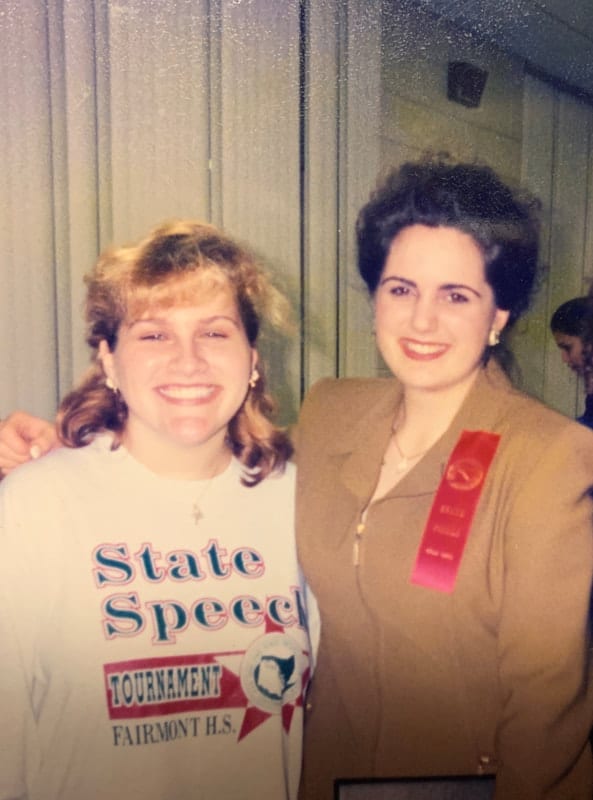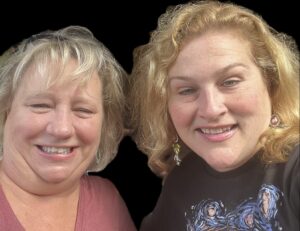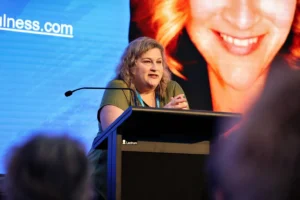My mouth was agape when Ramona, a member of the Dancing Mindfulness community and now a senior affiliate trainer in our program, revealed this to me several years ago. While I didn’t wish to negate her experience, there was a part of me that wanted to rage back, “But you don’t understand! I’m anything but a popular girl. After all, the popular girls in school gave me a complex that’s taken years of therapy to repair!”
The images of that chubby girl with a bad perm being teased and set up on the Catholic school playground in elementary school came flooding back. The panic I experienced in junior high that I would never be “liked” in that way by a boy or a girl rose up in my chest. The despair in which I found myself as a competitor in high school speech because I never felt pretty enough, talented enough, or likable enough to win the top prizes came into the clearest view. Then I realized—even as an accomplished professional with a public image, I still let the kids I perceive as more popular affect me. And it turns out that many of us still do, long into adulthood.
There’s a great deal of talk about impostor syndrome in pop psychology literature and on social media—the fear that one day people are going to expose us as the frauds that we are and realize that we’re full of shit and have no business to be working in our fields. What I am putting out there for consideration is related and yet essentially different—the popular kid complex. This is the fear that no matter how hard we try, how great we look or how talented we are, we’ll never be invited to sit with the popular kids at their lunch table. While we can argue that in an ideal, spiritually enlightened world there ought to be no such thing as lunch tables and that external metrics of this nature shouldn’t matter, we do live in that world. And no matter how hard we work on ourselves or how deeply we invest in our spiritual practices, things like this can still matter even to the steadiest among us.
This idea may feel like just another variation on the keeping up with the Joneses concept, always wanting more out of a sense of competition. To explain how I see the popular kid complex as fundamentally different and even bigger problem, I’m going to call myself out on my own shit. Many years ago, I set out on the path of my teaching career as an extension of service and continuing to live in the eleventh step as described in a 12-step program—to pray for knowledge of my Higher Power’s will and the power to carry it out. At first I was simply over the moon that people wanted to book me for trainings and read some of my articles. The more I kept putting myself out there, I gratefully received more teaching invitations and my first book contract in 2011, primarily to write for other therapists.
Then at some point, I found myself getting intimated and maybe even a little jealous by the likes of Brené Brown, Gabrielle Bernstein, and Anne Lamott. They are popular! They are on the New York Times best seller list! They have a reach beyond just their niche market. Oprah invites them onto Super Soul Sunday, the ultimate cool kids lunch table for modern times. Here’s the kicker—I like their stuff, I adore their teachings. They put themselves out there the way that I would like to, and what still stops me short is this fear that I will never be as pretty, whimsical, charming, likable, talented, relatable, or popular as they are. I am even prone to thinking thoughts like, “Why does the world need teachers like me when they have teachers like them?”
Fortunately those thoughts come and go, as I know at my core that what I do in my work is a direct fruit of me asking my Higher Power and the universe to make me a vessel, in whatever form that may take. But as much as that spiritual perspective keeps me grounded, I am still human. My meat suit and all its programming can get the best of me. In the language of recovery, I can still get in my own way.
Sometime last year I looked at jealousy—is it that I’m just jealous of people who are better than me and can get things done where I can’t? The teachings of the Kripalu-Amrit lineage in which I study yoga helped me through that one. I accepted that jealousy is a fear that, at my core, I am not enough. Jealousy is about being cut off from the reality of my true Self and my true nature where none of us are separate. Spiritual me gets that. Human me still struggles.
I was recently doing some of my own EMDR therapy on this matter and the Brené Brown brings up my popular girl issues and I’ll never be likable enough to get a Netflix special was tripped-wired. The therapist working on me said “go with that” and I immediately blurted out, “Brené Brown is my Marla Carano.”
Marla Carano was the best speaker in the Ohio region where I competed my senior year of high school. Tall, articulate and charming, she looked about ten years older than the rest of us, wearing a stylish olive green suit for major competitions. She went to one of the powerhouse suburban high schools where her father was the legendary head coach. As a kid from a city school with a small team, I believed I could never be as cool as her. To be clear, she won on her talent. Also to be clear, Marla was always a gracious competitor and genuinely nice to me. I never felt anything like a “mean girl” vibe coming from her. Yet I could never shake the fact that I would perpetually be second or third next to the likes of her because I wasn’t as pretty, whimsical, charming, likable, talented, relatable, or popular as she.
And the reality is, in what has since become the classic Dr. Jamie Marich move that has defined my adult career, I wrote a pretty avant-garde original oratory for high school speech tournaments. My speech created conversations with other students and even other judges even if I didn’t necessarily win top prizes. The move I made that year to put my voice out there is the gutsiness that I celebrate and applaud in my own students. That move, I believe, made me the speaker I am today whose primarily livelihood is literally forged on my ability to go up there and speak truth without fear.
So why isn’t that enough? At seventeen, one could say I was still in high school and having a place in the spotlight matters. But I’m nearly forty. Why can I feel, especially within myself, that life is still a damn speech and debate competition? Maybe it is. After all, I’m still vying with others to win teaching contracts, spots as a keynote, deals with publishers. The cynical and yes, human, side of me knows that there will always be an element of competitiveness to life. As I continued to “go with it” in my own EMDR session that day the larger, spiritual truth filled my heart—teaching and being public in my field must never be a competition.
Our purpose as healers is to alleviate human suffering, bringing one of Buddha’s noble truths into beautiful fruition in this world. This task takes all kinds of people—those who have mass appeal and those who have niche appeal—and all types of talent. Working the front lines of community care in places like correctional facilities, treatment centers, and poorly funded public mental health facilities requires talent and commitment. People who will never give a training or write a book have a different yet wholly essential talents that I do not. This is where the heart of our work is happening and when I get into crazy places with my own ego, I must remember this truth.
In preparing to write this piece, I reached out to Marla Carano Honen, as we’ve been in touch on Facebook through the years. I wanted to make sure she was okay with me putting an article out there in which she is my nemesis of sorts. Marla is anything but a villain; she has helped me to see a higher truth. And in speaking with her about the premise of the popular kid complex—guess what? It affects her too! I firmly believe we are all that “popular kid” to someone who brings up their issues, and all of us have popular kids who bring up stuff that as adults we must learn to heal and to manage.
I also had the chance to spend some time on a retreat (Ram Das: Spring on Maui) with one of my legendary popular kids, Anne Lamott. And guess what? Anne has struggled with the perils of comparison and can still face her own share of dark thoughts. What I learned from her so robustly on retreat is that she continues to put one foot in front of another by working a 12-step program and reaching out to safe people with whom she can be honest. And in a story I ended up sharing with her, Anne helped me to sink into much of the solution.
After sitting through another beautifully folksy talk by Anne in her awkward loveliness, I walked to the back of the pavilion to get some tea. I thought to myself, “Jamie, even though you are getting more public with your work you will never be as likable as that.” And literally in the next breath a lovely young yogi comes up to me and says, “I like watching you dance at the kirtan. It’s so inspiring!”
Okay, I’m human enough to admit that part of my thinking went to, “Wow, a perfect looking young yogini likes the way I dance, I matter… I am valid! Roll credits.” Fortunately the spiritual truths of what I’ve been learning and studying kicked in and gave me the real lesson: When I dance, I am my most authentic self. I dance absent any kind of technical prowess. Dancing and responding mindfully to the music is the purest experience of being a vessel for Divine energy to flow. That doesn’t make me popular, and yet it does something much more magical. It attracts the people who need to feel it too so that hopefully they will be inspired to open up and be their unique expression of Divine flow.
And hmmm… doesn’t this sound like something Brené Brown would teach in her groundbreaking work around vulnerability? Turns outI just had to work on my edge around her to fully open myself up to the teaching. From the bottom of my heart, I thank you Brené and all of my other popular kids for allowing me to “go there” and receive your wisdom.




